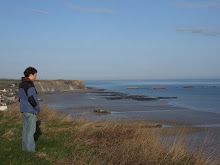Bank of England anticipates Spring 2010 end to Economy Woes
I have personally remained thoroughly apathetic about the whole economic downturn of the last couple of years. Sure, people have lost jobs, goods have been produced for markets that don't want them or can't afford them and global currencies have fluctuated like never before, but it could never have been all doom and gloom. The global economy simply doesn't function like that. Especially since the abandonment of the
gold standard. The fiat system, essentially based on metaphysical IOU's, greatly reduces the value of money as well as its strength as a method of payment. It is no longer based on the value of, well anything except itself really, it is simply a stream of numbers flying about some bizarre ether.
Cash money and, increasingly, electronic fund transfers, now serve simply as a nominal markers of value. Maybe this caused the collapse of the US stock market that precipitated this current crisis. Perhaps, as I suspect, it is simply a natural, though unfortunate, side effect of a free market economy, in the same way that the Wall Street Crash was a natural downturn in the global economy. Obviously there were other factors at work both in 1929 and 2008 (interestingly, it was probably an after effect of war), but the outcome has been similar.
The point of all this, acknowledging that the world is in recession, something which, had it been acknowledged sooner, might have hastened its onset and thus its passing, rather than dragging it out and hiding it behind the euphemistic "Credit Crunch" moniker, is that it will inevitably end. It is not for the banks or governments of the world to fix. Free market economies, on the present scale, are a product of the industrial revolutions of the late nineteenth and late twentieth centuries. These are phenomenons which are still not fully understood. The implications of the first industrial revolution are being relived in the Green movement, as humans realise the impact their actions of the last century of burning. The ramifications of the second industrial revolution are being played out at 'tech shows' across the globe.
The Bank of England's
announcement that the recession will be over by Spring of next year shouldn't be a surprise. Instead, it should be obvious. Anyone with a sense of history would be able to see that the world went from its darkest days in 1929 to mass slaughter, and the development of ultra-expensive, and essentially useless, weapons in just ten years. With modern technology, and
Moore's Law, this turn around will be far swifter. Hopefully it won't be to the same end. Luckily, those "essentially useless weapons" play an important role here.
In acknowledging that last point, and in light of what I wrote
yesterday, perhaps there is a cautionary nature to the current recession. After all, consider Nazi Germany. It rose from a crippled mess, to a force which could have succeeded in subjugating, if not the world, at least vast swathes of Western and Eastern Europe and tracts of Russian Steppes. Maybe it is worth engaging North Korea. She does possess some powerful "allies" in South East Asia and the Middle East.
I digress, for my point is not to draw comparisons between 1929 and 2008, aside from the inevitable recovery. The world would eventually collapse on itself without its interlinked economy. Of course, it's easy to say things like that, much harder to let them happen. But, I think that, like anything that goes wrong but will eventually recover, it's going to get worse before it gets better. But it will get better. I think that placing arbitrary signposts is a bad idea, as it will serve to further disappoint if it is not reached.
